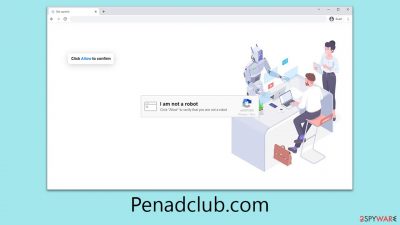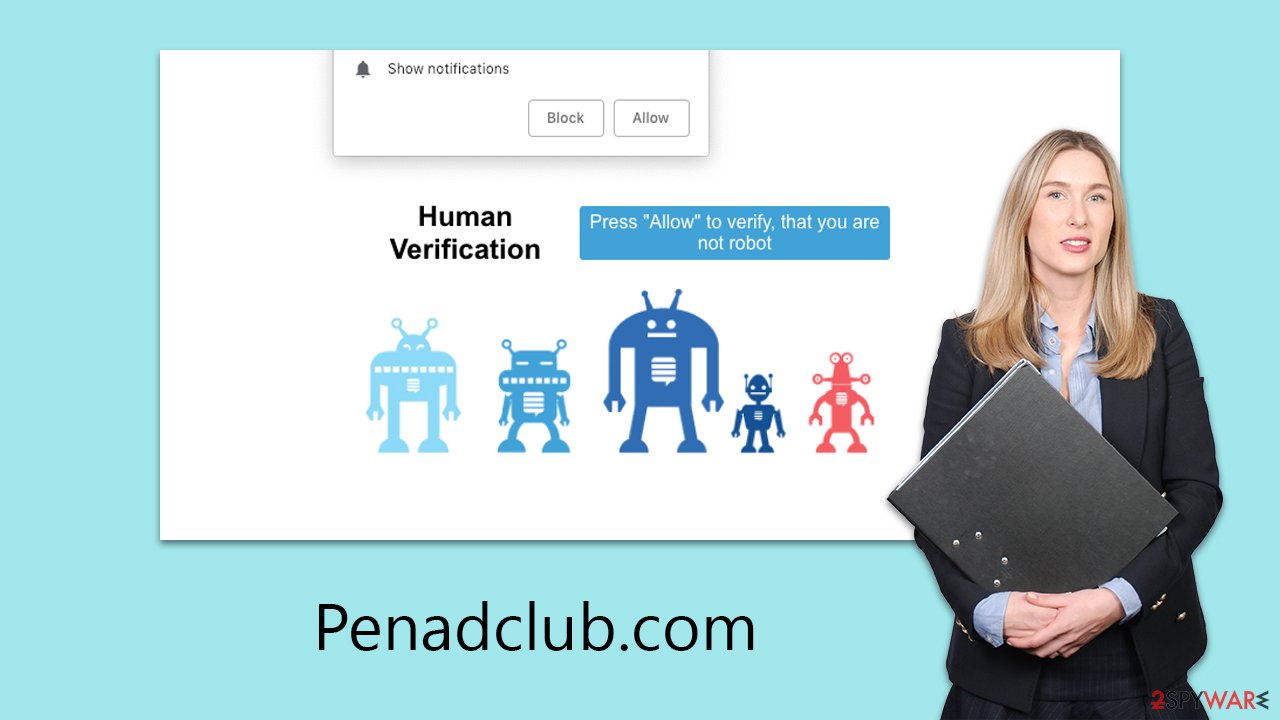Penadclub.com ads (scam) - Free Instructions
Penadclub.com ads Removal Guide
What is Penadclub.com ads?
Penadclub.com misleads users only to insert malicious ads into their systems

Penadclub.com is a deceptive website designed to mislead users into enabling push notifications, which subsequently permit the display of unsolicited advertisements directly on their devices. Users typically encounter Penadclub.com through inadvertent clicks on dubious links, leading them to a page displaying a fraudulent message. This message falsely encourages visitors to click the “Allow” button, often under the guise of verifying their identity or accessing content.
Upon consenting, users find their screens inundated with persistent Penadclub.com ads. These advertisements intrude at random intervals, irrespective of the user's current online activities or the applications in use. The critical concern with Penadclub.com lies in the nature of its advertisements and links. These often include malicious content such as phishing attempts, false virus infection alerts, fraudulent prize offers, and other harmful material.
It is imperative to avoid interacting with any content from Penadclub.com. For those affected, we provide detailed instructions on how to cease these intrusive activities, ensuring the protection of both your digital devices and personal information.
| Name | Penadclub.com |
| Type | Push notifications, ads, pop-ups, scam |
| Distribution | Intrusive pop-ups can start showing up at some point after the “Allow” button is pressed within the notification prompt |
| Symptoms | Notifications show up at the bottom-right corner of the screen – these include fraudulent content and links to potentially dangerous websites |
| Risks | If you click on a website's links, you risk infecting your computer with malware/PUPs, giving away your personal information to hackers, or wasting money on useless services |
| Removal | Access browser settings to stop intrusive push notifications. After that, make sure that your system is not infected with adware or malware – scan it with SpyHunter 5Combo Cleaner |
| Recovery | You should check your system with FortectIntego to fix virus damage and remove various trackers from your browsers |
How scammers spread fraud online
The internet, while a powerful tool for information access and communication, also harbors risks associated with cyber fraud. Its vast and dynamic environment provides fertile ground for scam websites like Penadclub.com to emerge and rapidly victimize users.
This problem is often exacerbated by rogue advertising networks and loosely regulated websites that disseminate or host harmful content, such as malicious ads, infected files, or deceptive 'Download' links. These elements contribute to expanding the influence of online scammers.
Sites offering illegal content, like pirated software or torrent cracks, are especially dangerous. Such websites can redirect visitors to phishing pages or act as channels for malware infections, rendering interactions with them fraught with risk.
The situation is further complicated by the presence of adware, a type of software that can be detrimental. Adware operates in the background, altering the browsing experience by imposing ads over legitimate content or inserting dangerous links into text. This increases the probability of users inadvertently accessing questionable sites like Penadclub.com. Exercising caution in website navigation is essential to maintain a safe online experience.
Pop-up ads are not the same as push notifications
Understanding the mechanics and differences between push notifications and pop-up ads is essential for maintaining online safety.
Push notifications are alerts sent directly to a user's device from an app or website, intended to provide timely updates or information. Their operation involves a two-step process:
- The user must explicitly allow a website or app to send them notifications.
- Once permission is granted, the website can push updates and information to the user's device, which will display these notifications regardless of whether the user is actively engaged with the website or app.
Pop-up ads, in contrast, are a form of online advertising where ads emerge in a new window or tab in the user's browser. Their functioning is characterized by:
- Automatic appearance when a user visits a website, without requiring user permission.
- Confinement to the duration of the browser session, not extending beyond the active browsing.
The primary distinctions between push notifications and pop-up ads hinge on user consent, delivery mechanism, and duration. Push notifications require explicit user approval and are more invasive, appearing directly on the device irrespective of active usage. Pop-up ads, however, surface automatically during a browsing session and do not follow the user outside of it.
Adware, a type of malware, exacerbates the issues with these advertising methods. It can be inadvertently installed from dubious websites or unverified software, leading to an onslaught of unwanted ads and notifications. This not only disrupts user experience by slowing down systems and interrupting tasks but also poses a security risk, as these ads might redirect to malware-infested sites or phishing attempts.
How people get tricked
Users generally wouldn't knowingly consent to receiving push notifications from dubious or unsafe websites. However, scammers employ cunning strategies to trick users into subscribing. A prevalent deceitful tactic includes a prompt like:
Click Allow if you are not a robot.
While the wording and accompanying imagery, such as a robot, may vary, the underlying strategy remains the same: asking users to confirm they are human. Given the prevalence of such human verification tests in digital interactions, it's easy for individuals to be misled by these prompts on scam websites like Penadclub.com. Most internet users are familiar with selecting correct images or solving CAPTCHA challenges during their online sessions.

However, this is just one example of the deceit users may encounter. The presentation can shift, taking on various guises. For instance, users might be misled to think that their browser is blocking a video from playing. They could be duped into believing they have won a significant prize or be prompted to verify their age. Regardless of the message or the visual context, the intent behind the push notification prompt remains singular.
Despite their convincing appearance, it's vital to recognize these tactics as mere deceptions. These tricks, widely used by scam websites exploiting push notifications, aim to prompt impulsive actions. Being aware of these deceptive methods is key to avoiding falling prey to such online scams.
Get rid of unwanted push notifications and check your system
Penadclub.com push notifications can be particularly misleading, often causing users to misunderstand their origin and mistakenly attribute them to malware. Some users might even conduct virus scans on their devices, only to discover that these notifications must be manually disabled through browser settings.
It's crucial to be aware that adware and other forms of unwanted software could be operating covertly on your device, potentially leading to malware infections. To address the risks associated with Penadclub.com, we advise conducting a thorough system scan using dependable security software. for example, SpyHunter 5Combo Cleaner and Malwarebytes could be a good choice. Such tools are designed to detect and eliminate hidden threats.
Additionally, employing a utility FortectIntego to clean browser caches and cookies can aid in halting further data tracking and remove any lingering traces of the malicious site.
To remove Penadclub.com push notifications, one needs to modify the browser settings to manage the site's permissions. While the exact steps may vary slightly depending on the browser, the general procedure involves accessing the settings, locating the notification permissions section, and then blocking or deleting the site from the allowed list. Detailed instructions for this process are as follows:
Google Chrome (desktop)
- Open the Google Chrome browser and go to Menu > Settings.
- Scroll down and click on Advanced.
- Locate the Privacy and security section and pick Site Settings > Notifications.
- Look at the Allow section and look for a suspicious URL.
- Click the three vertical dots next to it and pick Block. This should remove unwanted notifications from Google Chrome.
![Stop notifications on Chrome PC 2 Stop notifications on Chrome PC 2]()
Google Chrome (Android)
- Open Google Chrome and tap on Settings (three vertical dots).
- Select Notifications.
- Scroll down to the Sites section.
- Locate the unwanted URL and toggle the button to the left (Off setting).
![Stop notifications on Chrome Android Stop notifications on Chrome Android]()
Mozilla Firefox
- Open Mozilla Firefox and go to Menu > Options.
- Click on Privacy & Security section.
- Under Permissions, you should be able to see Notifications. Click the Settings button next to it.
- In the Settings – Notification Permissions window, click on the drop-down menu by the URL in question.
- Select Block and then click on Save Changes. This should remove unwanted notifications from Mozilla Firefox.
![Stop notifications on Mozilla Firefox 2 Stop notifications on Mozilla Firefox 2]()
MS Edge (Chromium)
- Open Microsoft Edge, and go to Settings.
- Select Site permissions.
- Go to Notifications on the right.
- Under Allow, you will find the unwanted entry.
- Click on More actions and select Block.
![Stop notifications on Edge Chromium Stop notifications on Edge Chromium]()
Safari
- Click on Safari > Preferences…
- Go to the Websites tab and, under General, select Notifications.
- Select the web address in question, click the drop-down menu and select Deny.
![Stop notifications on Safari Stop notifications on Safari]()
Internet Explorer
- Open Internet Explorer, and click on the Gear icon at the top-right of the window.
- Select Internet options and go to the Privacy tab.
- In the Pop-up Blocker section, click on Settings.
![Stop notifications on Internet Explorer Stop notifications on Internet Explorer]()
- Locate the web address in question under Allowed sites and pick Remove.
How to prevent from getting adware
Do not let government spy on you
The government has many issues in regards to tracking users' data and spying on citizens, so you should take this into consideration and learn more about shady information gathering practices. Avoid any unwanted government tracking or spying by going totally anonymous on the internet.
You can choose a different location when you go online and access any material you want without particular content restrictions. You can easily enjoy internet connection without any risks of being hacked by using Private Internet Access VPN.
Control the information that can be accessed by government any other unwanted party and surf online without being spied on. Even if you are not involved in illegal activities or trust your selection of services, platforms, be suspicious for your own security and take precautionary measures by using the VPN service.
Backup files for the later use, in case of the malware attack
Computer users can suffer from data losses due to cyber infections or their own faulty doings. Ransomware can encrypt and hold files hostage, while unforeseen power cuts might cause a loss of important documents. If you have proper up-to-date backups, you can easily recover after such an incident and get back to work. It is also equally important to update backups on a regular basis so that the newest information remains intact – you can set this process to be performed automatically.
When you have the previous version of every important document or project you can avoid frustration and breakdowns. It comes in handy when malware strikes out of nowhere. Use Data Recovery Pro for the data restoration process.






